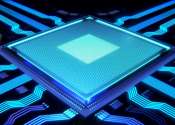Researchers make progress towards high-performance, aqueous zinc-ion batteries
A team led by Prof. Song Li from the University of Science and Technology of China (USTC) of the Chinese Academy of Sciences (CAS) proposed the concept of intercalant-induced V t2g orbital occupation and developed an NH4+-intercalated ...
May 8, 2023
0
319









